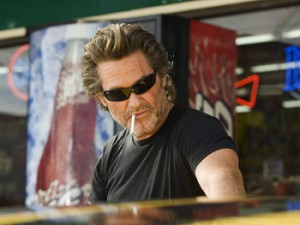|
Hmm. Well. Hmm. What do I say? Make a reference to the fact that the title didn't in any way refer to the film's theatrical fate? Probably been done. Being a critic, whether paid or just for the hell of it, seems constantly about being clever, and in this sense they often fall victim to the very same tropes they so often accuse their prey, i.e. the films they review, of playing to, those being a general lack of cleverness or originality. I remember a recent film (well, actually, that's not true, but I do remember the fact that there was one) wherein every review I read made the exact same pun from the title, proving that the film's detractors were just as uncreative as the film they were lining up to bash. It's a widespread problem, but not one I ever expected to see from Quentin Tarantino. 
I need not rehash here the story of the double Grindhouse feature's ultimate and sad fate. If you're reading this here, you know it already. Despite having long enjoyed the films of both Tarantino and Rodriguez, I managed to miss the theatrical run entirely, perhaps because it ran its course while I had popped into the bathroom. After the DVD came out, in its extended format, I sat down to watch this new film by a favorite director, and couldn't help but wonder why an extended version had been deemed necessary. Regardless of what he intended to acheive, this is mostly Quentin on autopilot, with the requisite rambling conversations about long-forgotten pop culture and little tidbits of the lives of the individual characters. It's a technique he's employed very effectively before, but here it feels like he's just doing it for the sake of his own schtick. The extended conversations in Reservoir Dogs gave you a sense of the different personalities of the group of bank robbers as they struggle to figure out who amongst them is a traitor, and the talk in Pulp Fiction was often flat-out hilarious. Here, it seems to just go on forever without being interrupted nearly often enough by actual plot events. Despite having been the one introduce his filmmaking pal Robert Rodriguez to many of the films in the genre they meant to emulate, Rodriguez was the one who ultimately pulled off a movie (Planet Terror, the other half of the double bill) that actually seemed to fit into the tradition properly. Death Proof doesn't feel like a seventies exploitation flick at all, really, because it's derailed by far too much self-indulgent styling on the part of its director, who appears to have forgotten that in a violent exploitation film there would be some actual threat and/or violence long before the film had gotten to be an hour old. It's also oddly apparent just how quickly the faux "old film" gags, like bad image and clumsy edits or missing bits, disappear very quickly, replaced by a more standard Tarantino visual style. At the same time, despite spending so much time with the ostensible setup, the personalities of the characters he's introduced largely turn out to be really unimportant to the story, and in this sense it fails to really succeed as a Tarantino film, either. He could do well to look back at the script he wrote for From Dusk 'til Dawn, which was a virtually perfect genre film, with actual tension and scares all along the way, working in his characteristic dialogue without it ever becoming ponderous or self-serving. When the first big violent scene happens in Death Proof, it's over so quickly we never have time to feel tense or anxious; it resets to baseline in a flash and starts almost right back where it started. 
See, this is the sad part: when the big set piece of the film, the crazy car chase between the psycho ex-stuntman and a group of women film crew members, finally kicks off, the action is fucking awesome. It's all real, it's fast and it looks dangerous as hell. Professional stunt double Zoe Bell, who plays herself in the film's second half, has to hang onto the hood of a speeding car as another car bashes it all over the road, and for that alone I'll give her a major thumbs-up. The ending veritably screams "catharsis," though in perhaps one more way than it should: we really could've done well to have gotten to that bit of the movie a hell of a lot sooner. The film has maybe a half-hour's worth of story, dragged out to nearly two hours. Why? It's not even as if actual grindhouse films ran that long, so why the padding? Take it back down to the length of the theatrical release, and it'll probably flow better, though, and this is the important part, not by cutting the same bits that were cut for the theater. Why would anyone, anyone cut a lap-dance scene out of a wanna-be exploitation film? That sort of thing is the meat and potatoes of such a medium, and Tarantino of all people should have remembered that that's what people expect to see from such movies, as opposed to twenty minute conversations about long-forgotten bands nobody else cares about anymore. It's as if he's somehow morphed into the titular character from Barton Fink, a talented playwright and would-be screenwriter who's ultimately reamed out by his producer for trying to take a B-grade wrestling picture and make it into some kind of art statement, when all the target audience really wants to see is lots of wrestling. He even admits himself in regards to the overall lack of his trademark dialogue in Kill Bill that he didn't feel a simple revenge story needed to be encumbered with 'lots of extra crap.' Why then does a film about a nut who kills people with his car have more extraneous prattling than any film he's made previously? Does anybody know? There's a cute redhead who's inexplicably dressed in a cheerleader's outfit, and she gets one of the smallest parts in the film, even with the extended cut. The fuck, I ask, is up with that? Where did the man's good sense go? I really hoped to enjoy this film-hell, I hope to enjoy any film I see, but I honestly expected it more from a film by a man I know has talent and who has done so much good work in the past. I'm not going to assume that he's somehow lost touch with what makes his films good, or that it's all over from here on out; anybody can screw up. And Death Proof isn't an unmitigated disaster at all, it's just a letdown. The ending is wild and fun and ultimately hilarious, and there were a number of occasions along the way when I remember abruptly laughing at some line or gag that caught me off guard. It's just unfortunate that as I sit here writing this, I can't remember what any of them were.
-review by Matt Murray
|
|
||||||||